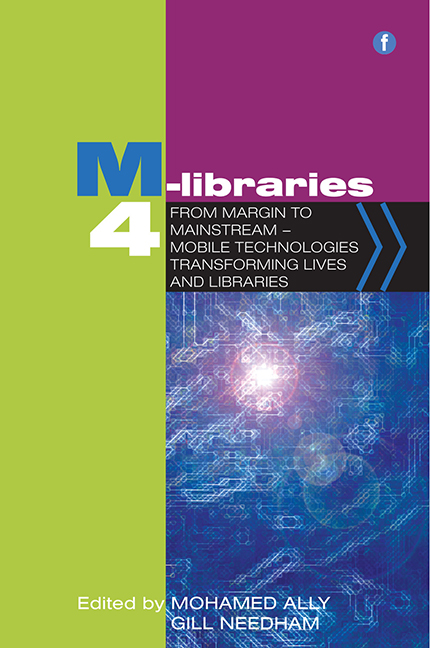15 - M-libraries on the hype cycle: where are we?
Published online by Cambridge University Press: 10 September 2022
Summary
Introduction
This chapter provides a snapshot of current and planned future mlibrary initiatives and current barriers to their implementation. It concludes with reflections on the current state of m-libraries in relation to the technology hype cycle. Though the focus of the chapter is UK academic libraries, due to the location of the researchers and source of funding, it also draws on examples from outside this area.
JISC-funded mobile library support project
Although mobile technologies and devices have been used in libraries for a number of years, many of the developments have been experimental in nature and not widely reported. In 2010, JISC (the Joint Information Systems Committee) invested in a programme of work to help develop knowledge and skills in the area and share lessons learned with other institutions. Five institutional projects were funded, including investigation of mobile interfaces for accessing academic content (MACON), bibliographic management on mobile devices (mbiblio), sharing specialist library-owned content via mobile devices (PhoneBooth), publicizing information to students through electronic displays and mobile devices (MoPED) and sharing study resources for law students (Mobile LearnMore by LawBore).
In addition to the institutional projects, JISC also funded a community support project aimed to bring together information both from the projects within the programme and from elsewhere and to share this with the wider community. The community support project, managed by Evidence Base at Birmingham City University in collaboration with Owen Stephens Consulting, aimed to ‘help support and engage the emerging m-library community by reviewing and synthesising existing research and evidence-based guidance’.
The project (which ran from November 2011 until October 2012) had two main areas of focus: evidence gathering and community building.
Evidence gathering
Under the evidence-gathering part of the project, information and resources were collected from existing projects within libraries utilizing mobile technologies. Information already online was shared by the project through a number of different mechanisms, including social bookmarking services and Twitter, all of which were combined into one RSS feed for people to subscribe to. The tag ‘mlibs’ was used across services to bring everything together. For information not already online, the project encouraged case studies and guest blog posts to share this information more widely. The lessons learned were particularly valuable for those libraries planning to do similar projects.
- Type
- Chapter
- Information
- M-Libraries 4From Margin to Mainstream - Mobile Technologies Transforming Lives and Libraries, pp. 135 - 146Publisher: FacetPrint publication year: 2014
- 1
- Cited by



